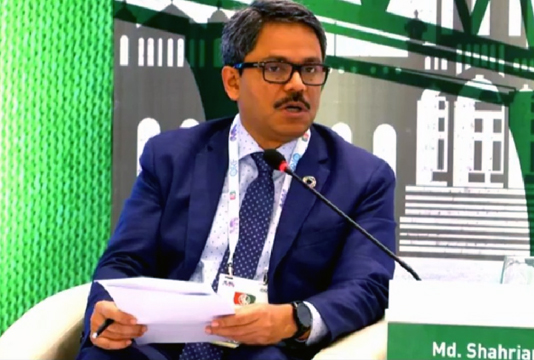DHAKA, Nov 12, 2019 (BSS) – State Minister for foreign Affairs Shahriar Alam today said Bangladesh believes the USA’s Indo Pacific strategy (IPS) and Chinese Belt and Road Initiative (BRI) are not conflicting but complementary to each other.
“Our position is loud and clear that we believe these (IPS and BRI) are complementary to each other, not conflicting … (But) it’s too early to jump into conclusion, as it’s (Indo-Pacific) still evolving, it’s a very new concept,” he said.
The state minister was speaking at a session tiled “Connecting the Indo-Pacific: Infrastructure and Influence’ on the second day of “Dhaka Global Dialogue 2019” at Hotel InterContinetal here.
Indian Member of Parliament Manish Tewari, Indian High Commissioner to Dhaka Riva Ganguly Das and professor of Institute of International Studies of Fudan University of China Minwang Lin also participated at the discussion. The state minister said most of the countries in the region have not clear idea what Indo pacific largely stands for “or what is the definition of it”.
“But one thing is evident that its Asian century, and this is the area that the World power, economy and military power are focused at, and that’s why countries in this region needs to remain to be in a close bonding and cooperation as much as possible,” he added.
Putting emphasis on connectivity and free trade for prosperity of Indo-Pacific region Shahriar said, “People prefer free movements, so thus the trade, and obviously trade is very important element of our national interest, regional interest for all the countries.”
The state minister also laid stress on utilizing the full potential of BIMSTEC that bridges South and South East Asia to strengthen further connectivity among the indo pacific region.
The BIMSTEC (Bay of Bengal Initiative for Multi-Sectoral Technical and Economic Cooperation) is an regional forum of seven South Asia and South East Asia nations – Bangladesh, India, Myanmar, Sri Lanka, Thailand , Nepal and Bhutan- those are among the countries dependent on the Bay of Bengal.
“South Asia region is most potential among indo pacific countries for obvious reason but we have to concentrate what we have like BIMEC … the low laying fruit,” he said, suggesting for mobilizing more resources in BIMSTEC initiative for betterment of the region.
Taking part in the discussion, the Indian envoy lauded amazing economic growth of Bangladesh and said “as we are holding global dialogue in Dhaka .. so it shows how important Dhaka is.”
About Indian perspective on Indo-Pacific, Ganguly said India is one of the fast growing economies and naturally it depends a lot on sea lane so “it (Indo-Pacific) is an important concept which is going to be more and more important”.
“For India, the important thing of Indo-Pacific, we are looking at a free open inclusive order which is safe secure and stable, we are looking at freedom of navigation and respect for the sovereignty of all Indo region, It’s not a strategy, not a club, not a grouping, India believes in an inclusive Indo-Pacific which is not exclusive any way,” she said.
This inclusive idea assured the interest of the region based on cooperation, international law and adherence to rule of law, she added.
Terming Bangladesh the most important neighbuor of India, Riva said both the countries are working together to increase the connectivity at utmost level. “So, for India, connectivity with Bangladesh is a game changer and we feel that both the countries are in win-win (situation).”
About the OBI and Indo-Pacific, Ganguly said: “I like to clarify that BRI and Indo-Pacific are not the same thing at all. BRI is a specific project while Indo-Pacific is note driven by a single country … Indo-Pacific is an understanding of what we believe – both natural and geographical – we can’t equate the two.”
Bangladesh Institute of International and Strategic Studies (BIISS) and India’s Observer Research Foundation (ORF) is jointly organizing the dialogue participated by 150 foreign dignitaries from 45 countries.



